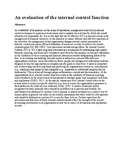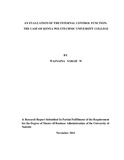| dc.description.abstract | As a substitute of its presence on the scene of operations, management must rely on internal control techniques to implement its decisions and to regulate the activities for which she would ultimately be responsible for. It is in this light that use of effective ICS’s is deemed crucial in the management of business resources.
In the endeavor to ensure efficient and effective operation of her activities, the management of any organization designs internal control procedures to allocate, control and ensure efficient utilization of resources, in order to achieve the overall corporate goals ISA 400 (2002). Such procedures include among others, the Internal Control Systems (ICS’s). ICS’s have long been advocated as a mechanism for establishing high quality financial reporting, and firms have voluntarily used them for this purpose, as they
give attestation on the reliability of the accounting and financial statements besides safeguarding assets of the firm.
In accounting and auditing, internal control is defined as a process affected by an organization's structure, work and authority flows, people and management information systems, designed to help the organization accomplish specific goals or objectives. It plays an important role in preventing and detecting fraud and protecting the organization's resources, both physical (e.g., machinery and property) and intangible
(e.g., reputation or intellectual property such as trademarks). This is achieved through proper authorization controls and documentation. At the organizational level, internalcontrol objectives relate to the reliability of financial reporting, timely feedback on the achievement of operational or strategic goals, and compliance with laws and regulations (COSO, 2011). At the specific transaction level, internal control refers to the actions
taken to achieve a specific objective (e.g. how to ensure the organization's payments to third parties are for valid services rendered) (Cook, 1979).
A system of internal control recognizes the basic principle that it should be as difficult as is practical and feasible, for individuals to be dishonest or careless. Such a premise is indeed not based on a cynical view of human nature in general, but rather on the realistic assumption that there could be a few persons who would be dishonest or careless if it is easy for them to be so. Further, apart from the prevention and detection of fraud, internal controls should reflect the strength of the overall accounting environment in an
organization as also the accuracy of its financial and operational records. | en |


